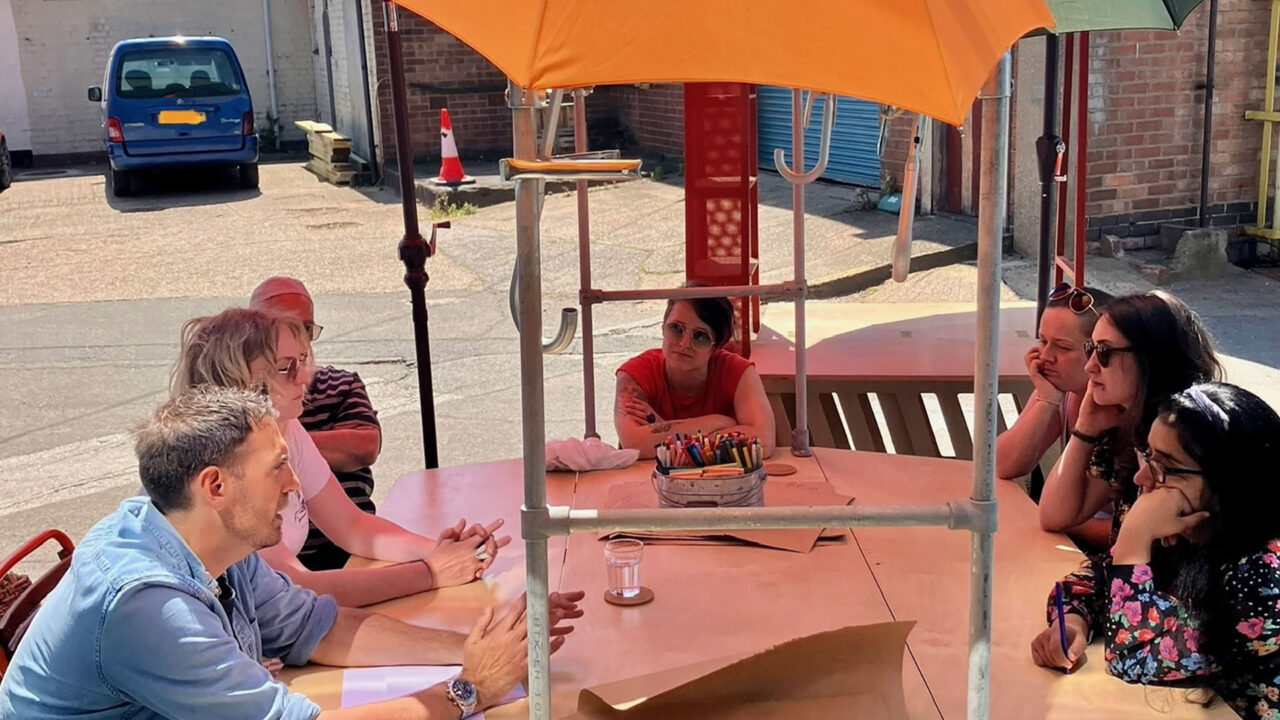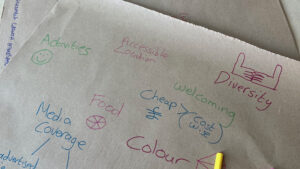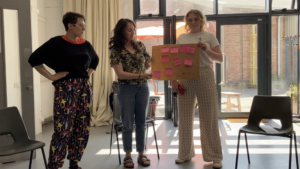- Posted on January 16th, 2024
Talking Birds – Pushing for People-Powered Change

Talking Birds is an NPO from Coventry, nurturing the next generation of artists and theatre makers.
About Talking Birds
Much of Talking Birds’ work aims to make space for conversations and shared experiences that allow/provoke/encourage people to collectively imagine and grow a vision of a better future – and to discover their own place and agency within that. Rob Hopkins’ lovely phrase for this kind of work is ‘creating a longing for something wonderful’ through the imaginative conversations and visualisations that set things in motion and that gently provoke action or inspire change.
We’ve long been interested in Citizens’ Assemblies and felt that this proven democratic format, where participants are selected by sortition*, might be the perfect way to bring together a group of people who were new to us and to each other. We wrote to 15,000 households inviting them to put themselves forward, and fifty Coventry people were selected to explore the question: “How will arts, culture and creativity help shape a better future for Coventry?”
Aims
We wanted to explore how people think culture should contribute to the necessary collective work of shaping a just, equitable, regenerative future that works for everyone – and to use what came out of this exploration to make interventions into local policy-making and push for real, people-powered change.
We wanted to engage with “ordinary people” (ie those not already invested in the arts sector) in imagining a better future – and we wanted to do this through the lens of creativity, hanging it on the peg of Coventry’s year as City of Culture. After four years of what felt like non-stop consultations about culture in the city, we were tired of having the same conversations with the same people – and we wanted to find out whether arts and culture actually mattered to anyone outside the arts. We felt that we needed to break out of the sector bubble and listen to different people in order to have our opinions challenged and be able to think differently about it all.

Positive outcomes and learnings
We were blown away by the discussions, by participants’ keenly felt sense of responsibility to represent all Coventry’s citizens, and the care they took in their deliberations. The nine resulting recommendations were beyond anything we had imagined the Assembly coming up with – and deftly sketched an ambitious and exciting green future Coventry, offering democratic, regenerative, equitable lives for all citizens, with democracy of access to arts and culture as creator, participant and audience.
Having handed the recommendations to the city’s Cultural Strategy group to feed directly into the consultation on the strategy refresh, Talking Birds set to work with Assembly members on pilot projects that could begin to test out the recommendations. When we had tried to imagine what the recommendations might be, in order to write our funding bids, we’d envisaged piloting short-term mini-projects; we didn’t expect to end up adopting the Assembly’s nine ambitious recommendations as a kind of long-term policy, programme and mandate for driving (in collaboration with the Citizens) people-powered change across our city.
I am certain that the Citizens’ Assembly changed all the people involved (whether participants, facilitators, scribes, artists or members of the oversight group) in both small and large ways, and it changed Talking Birds as a company – giving us courage, purpose, a mandate and a more confident voice at certain tables. Although the recommendations sketch city-wide change, there has to be someone steering that: agile, adaptive, focussed, making sure that it is happening/can happen. Although this is still our responsibility at the moment it is, of course, not our place to actually do everything and so we are working to equip Citizens with the skills and confidence to support them as they begin to share this responsibility. This year a small group of Assembly participants has, in collaboration with 64 Million Artists, completed Creative Citizen Changemaker training, with a view to grow the capacity in their neighbourhoods and begin live prototyping the Neighbourhood Hubs recommendation. This change is slow, gentle and incremental, but that feels ok – we have to build slowly in order to grow people’s confidence, capacity and agency – to reach each tipping point into authentic and lasting citizen-owned change.
We’re continuing to talk to the council and other policy makers about the recommendations and about how citizens (both Assembly participants and others) can have more direct input into, and influence over, policy making. And we continue to push the recommendations forwards on several fronts. As is often the case, raising funds to deliver the next phase of the project – to support the Citizens in growing community capacity and working with artists to realise the Assembly’s recommendations over a five (or more) year period – is a huge challenge. Having taken on these recommendations – this people-powered change – as a large part of Talking Birds’ work for the next few years means continuing to talk about the ideas and widen the conversation. It means keeping things fluid in order to take opportunities that arise to advance – or assemble coalitions that can deliver on – the Citizens’ recommended actions. It means lots of fundraising, and it also means keeping the relationships, connections and momentum going during the times where there is no funding and therefore very little project activity.
We believe that, in order to function well as citizens, we need to feel that we are informed, involved, valued and have agency. Time and again Citizens’ Assemblies have proved that when people are given the time, agency and space to collectively learn about, discuss and deeply consider something, they generally make really good decisions. With conversations we can sow the seeds of possibility and agency, while shared experience can build community. When imagining and rehearsing different futures we can see how we can make change. And with learning and experience we can grow the confidence and connections to do so.

Reflections
I think that the importance of thinking and talking about ‘something wonderful’ that has been collectively imagined is that it strengthens both the longing for it, and the determination to make something happen. We’ve imagined the sort of future we want, we’ve put a pin in the map, but we’re not yet entirely sure of the route we will take to get there. As time and people change, things move on, conditions change and ideas evolve. Change is a process, and thinking and talking together about these recommendations, re-imagining the details and how they might be achieved – even if these specifics are never fully realised – is important in and of itself, laying the ground for further change to happen.
The Sortition Foundation recruited our Citizens’ Assembly participants. Mutual Gain was our Citizens’ Assembly delivery partner and they helped train a fantastic group of locally-based artists to act as our group facilitators and scribes. This first phase of the Art for the People project – which included the Citizens’ Assembly, a series of pilot projects to test out recommendations, plus the Creative Citizen Changemaker training programme delivered by 64 Million Artists – was supported by ACE, the Esmee Fairbairn Foundation, Coventry City of Culture Trust and Coventry City Council.
* Sortition is essentially random selection – where everyone has an equal chance of being selected. Our participants were also ‘stratified’ which means that they were each compared against demographic data (such as age, gender, ethnicity, education, postcode) to ensure that the 50 selected could be demonstrated to be truly representative of the city.
This case study was written by Talking Birds

